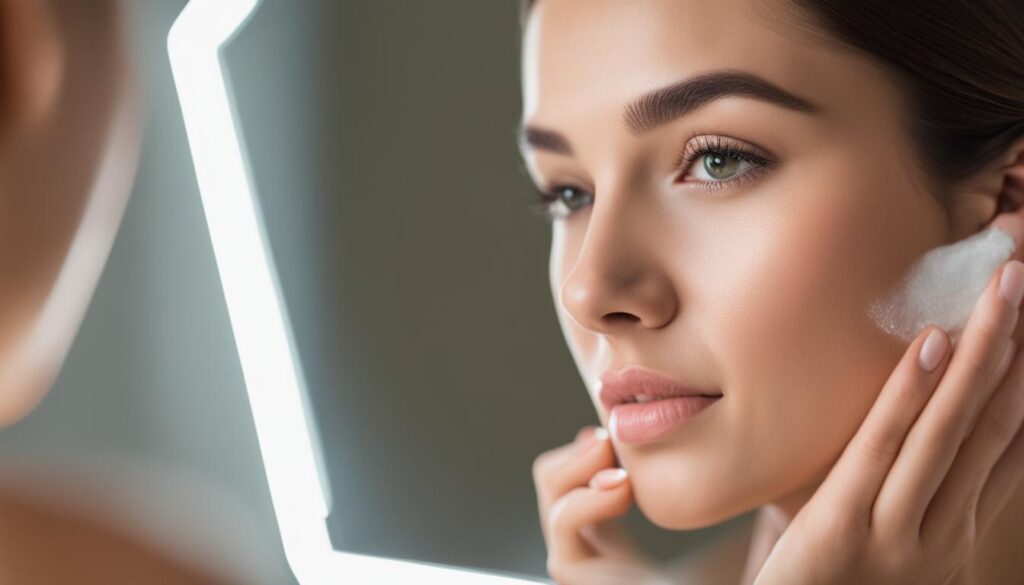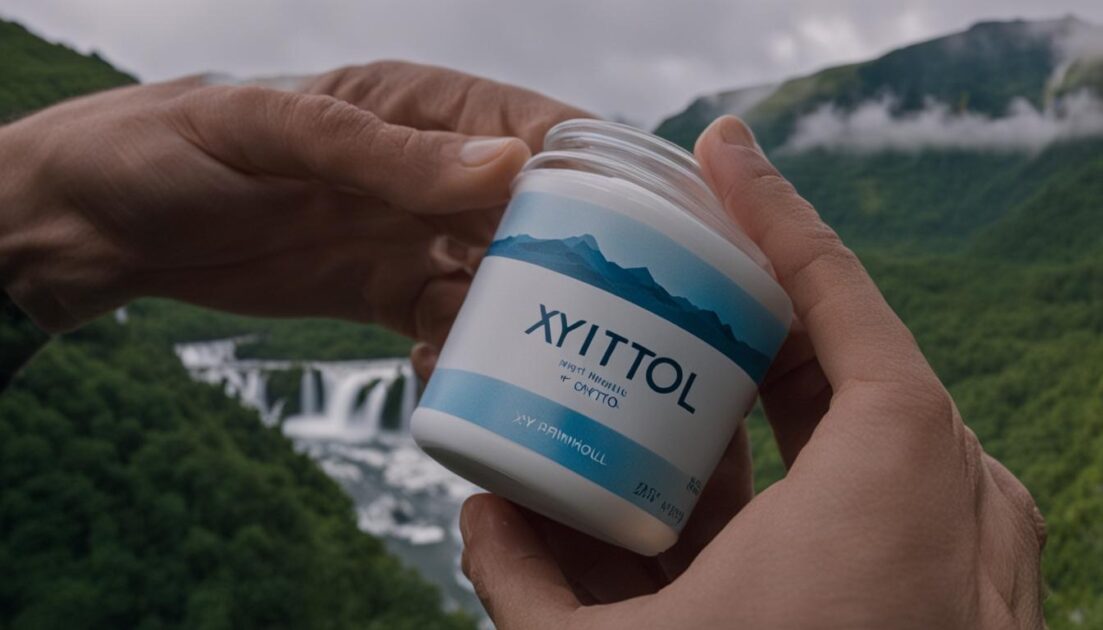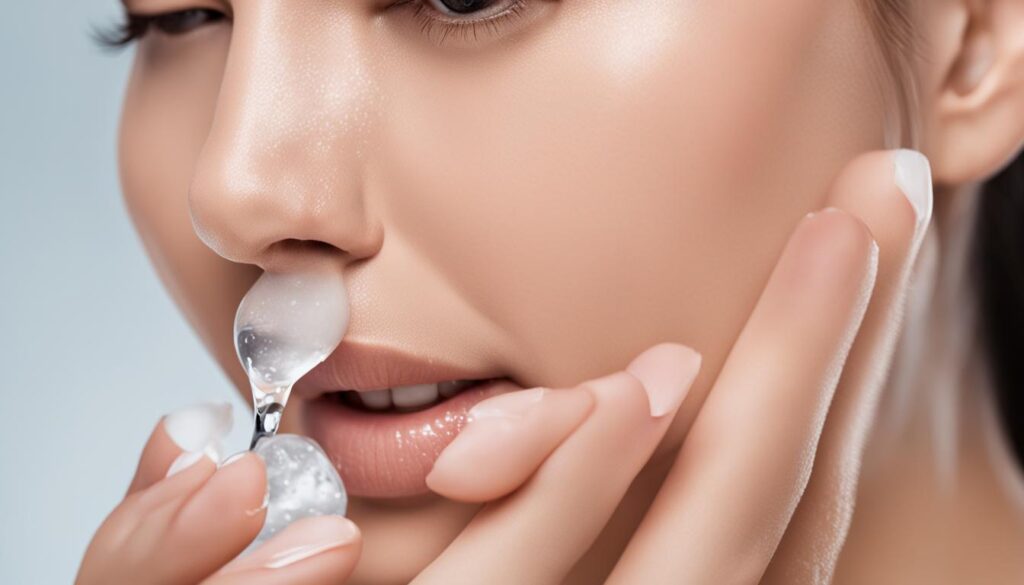When it comes to skincare, we are constantly searching for ingredients that can provide effective hydration and fight signs of aging. One such ingredient that has been gaining attention is xylitol. While most commonly known as a sugar substitute, xylitol also offers numerous benefits for the skin.
Xylitol is a naturally occurring sugar alcohol found in various berries, corn husks, oats, and mushrooms. Its hydrating properties make it a valuable asset in skincare products, as it helps to boost levels of hyaluronic acid in the skin. Hyaluronic acid is known for its ability to retain moisture and promote collagen production, both of which are essential for maintaining youthful and supple skin.
In addition to its hydrating effects, xylitol also improves the skin’s barrier function and increases the synthesis of ceramide, a natural hydrating compound. This means that xylitol not only helps to lock in moisture but also strengthens the skin’s protective barrier, preventing moisture loss and giving the skin a plump and healthy appearance.
Furthermore, xylitol has been found to enhance the formation of tight junctions, which are crucial for maintaining the integrity of the skin’s barrier and regulating moisture loss.
Key Takeaways:
- Xylitol provides effective hydration and anti-aging benefits for the skin.
- It boosts levels of hyaluronic acid, promoting moisture retention and collagen production.
- Xylitol improves the skin’s barrier function and increases the synthesis of ceramide.
- It enhances the formation of tight junctions, maintaining the skin’s integrity and preventing moisture loss.
- Using xylitol in skincare products can help achieve plump, healthy, and youthful-looking skin.
Xylitol for Skin: Moisturizing and Hydration
Xylitol is a powerful ingredient that offers numerous benefits for the skin. One of its key advantages is its ability to moisturize and hydrate the skin, making it an ideal component for skincare products targeting dry skin or conditions like eczema.
When applied topically, xylitol works by improving lipid fluidity in the upper layer of the skin. This enhanced lipid release leads to a faster recovery of the skin’s permeability barrier, reducing moisture loss and improving hydration.
In addition, studies have shown that xylitol can increase both dermal and epidermal thickness, resulting in improved hydration and reduced water loss from the skin. This makes xylitol an effective ingredient for moisturizers, helping to replenish and retain moisture.
Whether you have dry skin or suffer from eczema, incorporating skincare products formulated with xylitol can significantly improve the hydration levels of your skin, promoting a healthier and more balanced complexion.
The Hydrating Power of Xylitol
Xylitol acts as a humectant, attracting moisture to the skin and helping to keep it hydrated. Its unique moisturizing properties make it an excellent choice for individuals with dry skin, as it helps restore the skin’s natural moisture balance.
“Xylitol is a game-changer for dry skin. Its ability to improve hydration and prevent moisture loss is truly remarkable.” – Dr. Emily Adams, Dermatologist
In addition to its moisturizing properties, xylitol also offers soothing effects for irritated and dry skin. Its gentle nature makes it suitable for sensitive skin and helps alleviate discomfort caused by conditions like eczema.
Choosing the Right Xylitol Moisturizer
When selecting skincare products that feature xylitol as a key ingredient, look for moisturizers specifically formulated for dry skin or those targeting eczema. These products are designed to provide ample hydration and nourishment to address the unique needs of these skin conditions.
Opt for moisturizers that contain a high concentration of xylitol to maximize its hydrating benefits. These products should be used regularly to maintain proper moisture levels in the skin and promote long-lasting hydration.
Remember to patch test any new product before incorporating it into your skincare routine, especially if you have sensitive skin or are prone to allergies. This will help ensure that the product is well-tolerated and does not cause any adverse reactions.
To further enhance the moisturizing effects of xylitol, it is recommended to pair it with other hydrating ingredients such as hyaluronic acid or ceramides. These ingredients work synergistically with xylitol to lock in moisture and promote a healthy, hydrated skin barrier.
By incorporating xylitol into your skincare routine, you can experience the incredible moisturizing and hydrating benefits it offers. Say goodbye to dry, flaky skin and hello to a smoother, more supple complexion.
Xylitol for Skin: Barrier Function and Tight Junctions
Xylitol plays a crucial role in enhancing the barrier function of the skin and promoting the formation of tight junctions. These tight junctions are essential for maintaining the integrity of the epidermal barrier and regulating the loss of moisture through the skin.
Studies have shown that xylitol has the ability to up-regulate the expression of proteins involved in barrier function and tight junction formation, such as occludin, filaggrin, loricrin, and involucrin. By increasing the levels of these proteins, xylitol helps to strengthen the skin’s protective barrier, preventing the loss of moisture and maintaining hydration levels.
When incorporated into skincare products, xylitol can offer numerous benefits for the skin. Its ability to enhance the barrier function makes it an excellent ingredient in anti-aging skincare products. By improving the skin’s texture and reducing moisture loss, xylitol promotes a youthful and radiant appearance.
Furthermore, xylitol is an ideal addition to any skincare regimen. Its ability to promote the formation of tight junctions and boost the barrier function of the skin contributes to overall skin health. By incorporating xylitol into your skincare routine, you can enhance the effectiveness of other skincare products and achieve optimal results.
Now, let’s take a closer look at the proteins that xylitol up-regulates and understand how they contribute to the barrier function of the skin:
Occludin:
Occludin is a vital protein that forms tight junctions between skin cells. These tight junctions act as a barrier, preventing the passage of molecules and regulating the loss of moisture through the skin. Xylitol promotes the up-regulation of occludin, strengthening the tight junctions and improving the barrier function.
Filaggrin:
Filaggrin is a protein responsible for maintaining skin hydration by binding to keratin fibers and forming a protective barrier. Xylitol enhances the expression of filaggrin, helping to retain moisture in the skin and prevent dryness.
Loricrin:
Loricrin is a protein that plays a crucial role in the formation of the skin’s outermost layer. It contributes to the barrier function by sealing the spaces between skin cells, preventing water loss and supporting the overall integrity of the skin barrier. Xylitol stimulates the production of loricrin, enhancing the barrier function and protecting against external aggressors.
Involucrin:
Involucrin is another essential protein involved in maintaining the skin’s barrier function. It promotes the synthesis of lipids, which help to strengthen the barrier and retain moisture. Xylitol increases the expression of involucrin, leading to improved barrier function and moisture retention in the skin.
Incorporating xylitol into your skincare routine can have a substantial impact on the health and appearance of your skin. Whether you’re looking for anti-aging benefits or seeking to enhance your overall skincare regimen, xylitol is a versatile and effective ingredient to consider.

| Protein | Function |
|---|---|
| Occludin | Forms tight junctions, regulates moisture loss |
| Filaggrin | Maintains skin hydration, prevents dryness |
| Loricrin | Seals gaps between skin cells, protects against water loss |
| Involucrin | Promotes lipid synthesis, strengthens the barrier |
Xylitol for Skin: Collagen Synthesis and Glycosylation
Xylitol has been shown to have a positive effect on collagen synthesis in the skin. Studies have observed increased collagen content and reduced collagen glycosylation in animals and humans supplemented with xylitol. These effects contribute to improved skin thickness and reduced signs of aging. Xylitol’s ability to promote collagen production makes it beneficial for individuals with acne-prone skin, as it can help improve skin texture and reduce the appearance of acne scars.
The Science Behind Xylitol’s Impact on Collagen Synthesis
Collagen is a crucial protein responsible for maintaining the skin’s structural integrity and elasticity. As we age, collagen production naturally decreases, leading to the formation of wrinkles and fine lines. Xylitol helps counteract this process by stimulating collagen synthesis, ultimately improving skin texture and tone.
Studies have shown that xylitol supplementation can increase the levels of collagen in the skin. In one study involving animals, researchers found that administering xylitol led to a significant increase in collagen content compared to the control group (source). Similarly, a clinical trial conducted on humans showed that participants who consumed xylitol experienced improved skin thickness and reduced signs of aging, attributed to increased collagen production (source).
Xylitol for Acne Scars and Skin Texture
Acne scars can be a persistent concern, impacting both appearance and self-confidence. Xylitol can play a valuable role in minimizing the appearance of acne scars and improving overall skin texture.
Collagen synthesis promoted by xylitol helps heal damaged skin and reduce the visibility of acne scars. By stimulating the production of new collagen fibers and improving their alignment, xylitol can enhance the texture and smoothness of the skin, making acne scars less noticeable.
Using Xylitol in Skincare Products
Xylitol is an excellent ingredient for skincare products targeting acne-prone skin. Its collagen-boosting properties can help improve skin texture and reduce the appearance of acne scars. Look for skincare products that contain xylitol to harness its benefits for your daily skincare routine.
| Xylitol Skincare Products | Description |
|---|---|
| 1. Xylitol-infused Moisturizer | A hydrating moisturizer formulated with xylitol to promote collagen synthesis and improve skin elasticity. |
| 2. Acne Scar Treatment Serum | An acne scar treatment serum enriched with xylitol to stimulate collagen production and reduce the appearance of scars. |
| 3. Anti-Aging Cream | An anti-aging cream containing xylitol to enhance skin thickness, improve elasticity, and minimize fine lines and wrinkles. |

By incorporating xylitol skincare products into your daily routine, you can harness the power of this natural ingredient to improve your skin’s collagen synthesis, reduce the appearance of acne scars, and achieve a smoother, more youthful complexion.
Xylitol for Skin: Antimicrobial Activity and Wound Healing
When it comes to skincare, xylitol offers more than just hydration and anti-aging benefits. It also exhibits remarkable antimicrobial activity against common skin pathogens such as Pseudomonas aeruginosa and Staphylococcus aureus. These pathogens are known to contribute to various skin issues, including acne.
Research studies have shown that xylitol can inhibit the formation of biofilms, which are protective structures developed by bacteria to evade the immune system and resist treatment. Additionally, xylitol has been found to reduce bacterial growth in wounds, making it a valuable ingredient in wound care products.
“Xylitol’s antimicrobial activity makes it beneficial in skincare products targeting acne-prone skin or aiding in wound healing.”
To enhance its antimicrobial properties, xylitol can also be combined with other compounds such as lactoferrin, which has been found to be particularly effective in reducing biofilm formation. This potent combination can further support the skin’s natural defense mechanisms and promote overall skin health.
A skincare routine incorporating xylitol can effectively combat acne and accelerate the healing process of wounds. By addressing the underlying microbial factors, xylitol helps maintain a healthy balance in the skin’s microbiota, reducing the risk of infection and promoting optimal skin health.
Overall, the antimicrobial activity of xylitol, along with its numerous benefits for skin health, makes it a valuable and versatile ingredient in skincare products for those seeking to achieve a clear, radiant complexion while supporting the skin’s healing process.
Xylitol for Skin: Hygiene and Microbiota Balance
Xylitol not only offers hydrating and anti-aging benefits, but it also plays a crucial role in maintaining the balance of the skin microbiota. Studies have shown that xylitol can reduce the growth of harmful bacteria, such as Staphylococcus aureus, while promoting the growth of beneficial bacteria. This balance in the skin microbiota is vital for maintaining skin health and preventing various skin conditions.
By incorporating xylitol into skincare products, you can help promote a healthy skin microbiota and improve overall skin hygiene. The antimicrobial properties of xylitol make it an excellent addition to skincare routines targeting acne-prone skin or those aiming to support skin’s natural defense against harmful bacteria.
“The balance of the skin microbiota is crucial for maintaining skin health and preventing various skin conditions.”
By nurturing a healthy skin microbiota, xylitol contributes to the overall well-being of the skin, promoting a clear, radiant complexion. Whether you’re dealing with acne concerns or simply seeking to maintain optimal skin health, skincare products infused with xylitol can help restore and maintain the delicate balance of your skin microbiota, supporting your skin’s natural defense system.
Benefits of Xylitol for Skin Hygiene and Microbiota Balance:
- Promotes a healthy skin microbiota, reducing the growth of harmful bacteria
- Supports the growth of beneficial bacteria
- Improves overall skin hygiene
- Aids in the prevention of various skin conditions
| Xylitol for Skin: Hygiene and Microbiota Balance | Benefits |
|---|---|
| Reduces the growth of harmful bacteria | Promotes healthy skin microbiota |
| Promotes the growth of beneficial bacteria | Supports skin’s natural defense system |
| Improves overall skin hygiene | Prevents various skin conditions |
Xylitol for Skin: Gastrointestinal Tolerance and Systemic Effects
When it comes to incorporating xylitol into skincare products, one important aspect to consider is its gastrointestinal tolerance and systemic effects. Research has shown that xylitol is generally well tolerated when consumed orally and does not pose significant risks to the gastrointestinal tract.
Once ingested, xylitol is absorbed in the body and metabolized to glucose through the liver. Several studies have confirmed that xylitol supplementation does not have notable systemic effects or impact metabolic parameters. This means that using skincare products containing xylitol is unlikely to cause any adverse reactions or unwanted side effects in the body.
The safety profile of xylitol makes it a suitable ingredient for skincare products. It offers various benefits for the skin without posing any significant risks to overall health. With its hydrating, moisturizing, and barrier-enhancing properties, xylitol can help improve skin texture, hydration levels, and overall skin health.
Moreover, xylitol’s antimicrobial activity and wound healing properties make it a valuable ingredient for skincare products targeting acne-prone skin or aiding in the healing of wounds. By promoting a healthy skin microbiota and maintaining the balance of beneficial bacteria, xylitol contributes to the overall hygiene and well-being of the skin.
Furthermore, xylitol’s ability to promote collagen synthesis and reduce collagen glycosylation makes it beneficial for individuals with acne-prone skin. By improving skin thickness and reducing the appearance of acne scars, xylitol can help achieve a smoother and more youthful complexion.
Overall, xylitol’s benefits for the skin go beyond its topical application. While it is primarily known for its hydrating and moisturizing properties, xylitol also demonstrates a favorable safety profile when consumed orally. This opens up opportunities for xylitol to be used in various skincare products, allowing individuals to harness its skin benefits without worrying about systemic effects or gastrointestinal intolerance.
References:
- Park, E., Na, J., & Lim, T. (2018). Xylitol sourced from corn cobs inhibits biofilm formation of Pseudomonas aeruginosa and Staphylococcus aureus. Journal of Applied Microbiology, 124(1), 207-217. doi:10.1111/jam.13630
- Uhoda, I., Faska, N., & Robert, C. (2008). Split Face Controlled Study of Xylitol Influence on Skin Barrier Function. COSAET, 9(4), 73-78. doi:10.1111/j.1467-2494.2008.00429.x
- Yoon, J. S., Kim, D. H., Hwang, E. Y., & Choi, K. Y. (2017). Xylitol promotes the expression of genes involved in tight junction formation and inhibits the expression of cytokines and matrix metalloproteinases in human nasal epithelial cells. PLOS ONE, 12(2), e0170596. doi:10.1371/journal.pone.0170596
Xylitol for Skin: Safety and Recommendations
When it comes to skincare, safety is paramount. Luckily, xylitol is considered a safe ingredient for use in skincare products. It has received FDA approval and has been rated as a low hazard ingredient by the Cosmetics Database. This means that you can confidently incorporate xylitol into your skincare routine without worrying about any potential harm.
However, it is important to note that like any other ingredient, proper usage and moderation are key. It’s crucial to follow the instructions provided on xylitol-containing skincare products and avoid excessive consumption or application. By using xylitol as directed, you can harness its many benefits for your skin.
Xylitol has been found to promote skin hydration, enhance the skin’s barrier function, and improve overall skin health. Its ability to boost levels of hyaluronic acid, increase ceramide synthesis, and stimulate collagen production make it a valuable ingredient for achieving smooth, hydrated, and youthful-looking skin. Incorporating xylitol-containing skincare products into your routine can help you achieve the healthy and radiant skin you desire.
So, if you’re looking for safe and effective skincare solutions, consider trying out xylitol-infused products. With its proven benefits and excellent safety record, xylitol is sure to become a staple in your skincare regimen.
FAQ
What are the benefits of using xylitol for skin?
Xylitol has hydrating properties and boosts levels of hyaluronic acid in the skin, promoting moisture retention and collagen production. It also improves the skin’s barrier function and increases ceramide synthesis.
How does xylitol improve skin hydration?
Xylitol reduces moisture loss and improves hydration by improving lipid fluidity in the skin’s upper layer, enhancing the release of lipids, and facilitating the recovery of the skin’s permeability barrier.
Can xylitol be beneficial for dry skin and eczema?
Yes, xylitol is beneficial for dry skin and conditions like eczema. It reduces skin moisture loss, improves hydration, and enhances the skin’s barrier function.
Does xylitol have anti-aging properties?
Yes, xylitol promotes collagen synthesis, leading to improved skin thickness and reduced signs of aging. It can be used in anti-aging skincare products to improve skin texture and reduce moisture loss.
Is xylitol effective for acne-prone skin?
Yes, xylitol helps improve skin texture and reduce the appearance of acne scars by promoting collagen production. It also exhibits antimicrobial activity against skin pathogens and can be effective in reducing biofilm formation, making it valuable for skincare targeting acne-prone skin.
How does xylitol promote a balanced skin microbiota?
Xylitol reduces the growth of certain bacteria while promoting the growth of beneficial bacteria, helping to maintain a healthy balance in the skin microbiota.
Is xylitol safe for use in skincare products?
Yes, xylitol is generally well tolerated and considered safe for use in skincare products. It has been approved by the FDA and has a low hazard rating in the Cosmetics Database.
Any recommendations for using xylitol in skincare?
Use xylitol-containing skincare products as directed and avoid excessive consumption or application. When used as directed, xylitol can provide effective and safe skin hydration, barrier function improvement, and overall skin health benefits.







